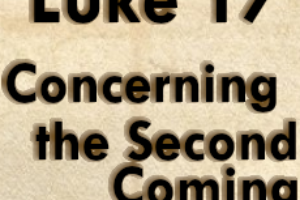Welcome to day 11, chapter 11 in Luke! We’re moving along and almost half-way through… Which also means we’re almost half-way to Christmas. Hopefully your able to get your shopping done. But before we get too off track, let’s take a look at Luke 11.
In this chapter we see Jesus deal with ritualism. This is among a number of things in this chapter. But happens to be the theme that really sticks out to me. He deals with ritualized prayer, signs and wonders, and religious rituals that the Pharisees held as more important that Scripture itself. Let’s take a look at this.
Conflicts Over Ritualized Prayer
In Luke 11:1-13 Jesus gives us our instruction on prayer. This comes by way of the disciples asking for His “method” of prayer, after watching Him. They wanted to follow the same pattern as Jesus. Culturally, the Jews would use prayer books and repeat the words from these books. This is actually a practice that is done today. Jesus addresses this with His words “when you pray” or “whenever you pray”. He is implying an infrequent repetition of the prayer he is about to give. Instead of this being a mindlessly repeated, rote prayer, this is an example of how we should set up our prayers. It is essentially a model of prayer to follow. While it is good to memorize this, as it is good to memorize all scripture, we must not get caught up in elevating this prayer above any other bit of Scripture. All too often, people can get caught up in these words, but, it is not the words that matter. It is the model we follow.
So, what is included in the prayer model?
- Address your prayer to God the Father
- Sanctify God or come to Him with an understanding of who He is (aka “Hallowed be your name”)
- Pray for the Kingdom Program
- Pray for your daily needs
- Confess your sins
- Pray over spiritual warfare
In addition, we need to be persistent about our prayer. We need to keep on asking, keep on seeking, keep on knocking. But always praying in the Will of the Lord. This does not mean that our prayers will be answered the way we want them to be. God is not a vending machine that will give us the Oreo’s when we press the “B2” button. Sometimes, the answer to our prayer is opposite of our request. This is the point of praying for the Kingdom Program. That is that our prayer is to be answered in accordance with the Lord’s will and plan. Not our own.
Conflicts Over Signs and Wonders
This is really seen in the bulk of the chapter, Luke 11:14-36. First Jesus deals with His critics after casting out a mute or dumb demon. He reminds them that every kingdom that is divided against itself is destroyed. So if he is casting out demons by the power of Satan, than Satan’s kingdom will crumble. Additionally, Jesus points out that their own theology teaches that the gift of casting out demons was a gift from God alone. So by ascribing this gift to Satan, then who do their sons cast them out by?
Jesus is acting in the power of God because He is God in the flesh
The miracle before them is considered a messianic sign, that is one that only the Messiah could do. It shows that Jesus is stronger than Satan.
Upon finishing this, the multitude has gathered and they are seeking for more signs! Not like any has already been provided to them. Jesus calls them “an evil generation” and says that the only sign to be given is “the sign of Jonah.” This refers to the sign of the resurrection.
The only way for this generation to escape the coming judgment is to believe in Jesus Christ as the Messiah. While this is addressed to the Jews of the first century, it is applicable to us today. The only way for us to escape the judgment at our death is to put our faith in Jesus Christ. To acknowledge that we are sinners in need of God’s forgiveness. To believe in Jesus Christ, that He died on the cross for our sins, and rose again on the third day. And to confess this as a statement of our faith. This is what the Jews will see happen before them. For us it is a step of faith based on historical evidence and eyewitness testimony.
Conflicts Over Religious Rituals
Lastly, I want to round out this by looking at how Jesus dealt with religious rituals in Luke 11:37-54. When studying the life of Jesus Christ, we need to keep in mind that He kept the Mosaic Law PERFECTLY. Whenever we see Jesus in conflict with a Pharisee, Scribe, or Lawyer, it is always over the Oral Law. The oral law was essentially a fence that the religious leaders were building. If a person broke an oral law, then there was still some “wiggle room” before they actually broke the Mosaic Law.
In this passage, Jesus does not wash His hands before dinner. The handwashing was a requirement of the oral law, not the Mosaic Law. The Pharisee that Jesus is dining with is quick to judge Him for this. However, Jesus rebuked him for his hypocrisy. The man was more concerned with keeping the externals of the law. Instead he needed to have more concern with the condition of his heart. That was the whole point of the Sermon on the Mount.
Jesus then deals with the hypocrisy by pronouncing woes on the Pharisees and Lawyers. We can learn a lot from these woes. As we look through them, ask yourself; “Do I practice any of these in my own walk with God?”
Woes on the Pharisees (Luke 11:42-44)
- Woe for they majored in the minors. They were concerned with the least important parts of the Law. They ignored the greater demands and never looked inward at the condition of their hearts.
- Woe for they seek their own glory. They would take the best stets in the synagogue. They would make remarks and demand respect.
- Woe for they are guilty of hypocrisy.
Woes on the Lawyers (Luke 11:45-51)
If you didn’t know, a lawyer in this context was an expert in the Mosaic Law and the Mishnah or Oral Laws.
- Woe for they make traditions mandatory. The lawyers would make compliance to their traditions a heavy burden.
- Woe for they rejected and killed the prophets. If they had listened to the prophets of old, they would see that they point to Jesus as the Messiah.
- Woe for they took “away the key of knowledge.” They hid the truth of the Scriptures from the people. What was the whole point of the Oral Law. They took the plain text and allegorized it. They hid the truth among their interpretations and deviated more and more away from Scripture over time.
Each of the six woes is a variation on a central theme. That being that one who focuses on external religious practices misses the point. The point that God judges the heart (Luke 16:15; Acts 1:24; 15:8). We need to examine our hearts and ensure that we do not fall into the same snare as the “religious” leaders, both of old and of today. It’s not the religion that one finds salvation in, but through faith alone, in Christ alone
For by grace you have been saved through faith. And this is not your own doing; it is the gift of God, not a result of works, so that no one may boast.
Ephesians 2:8-9 ESV





